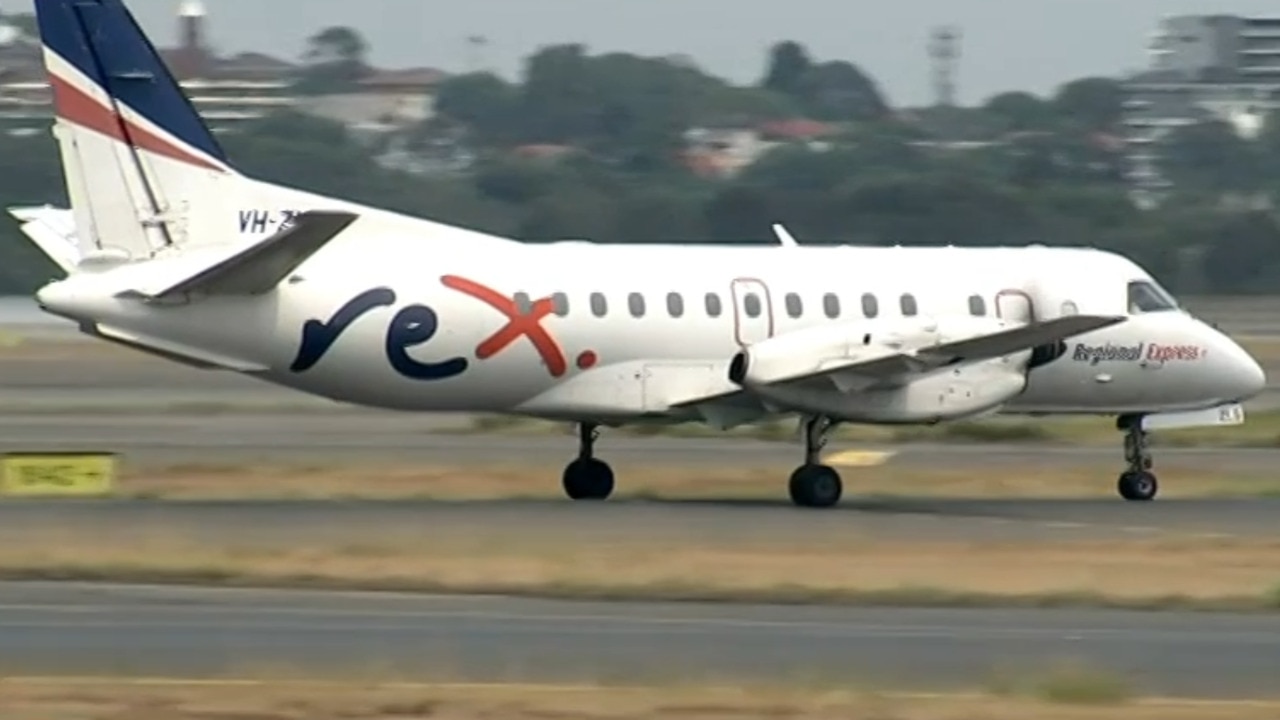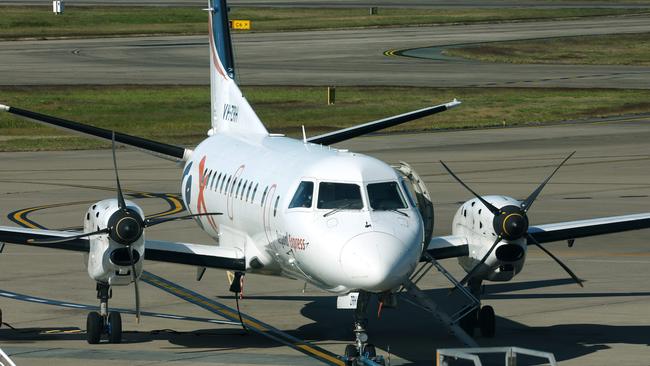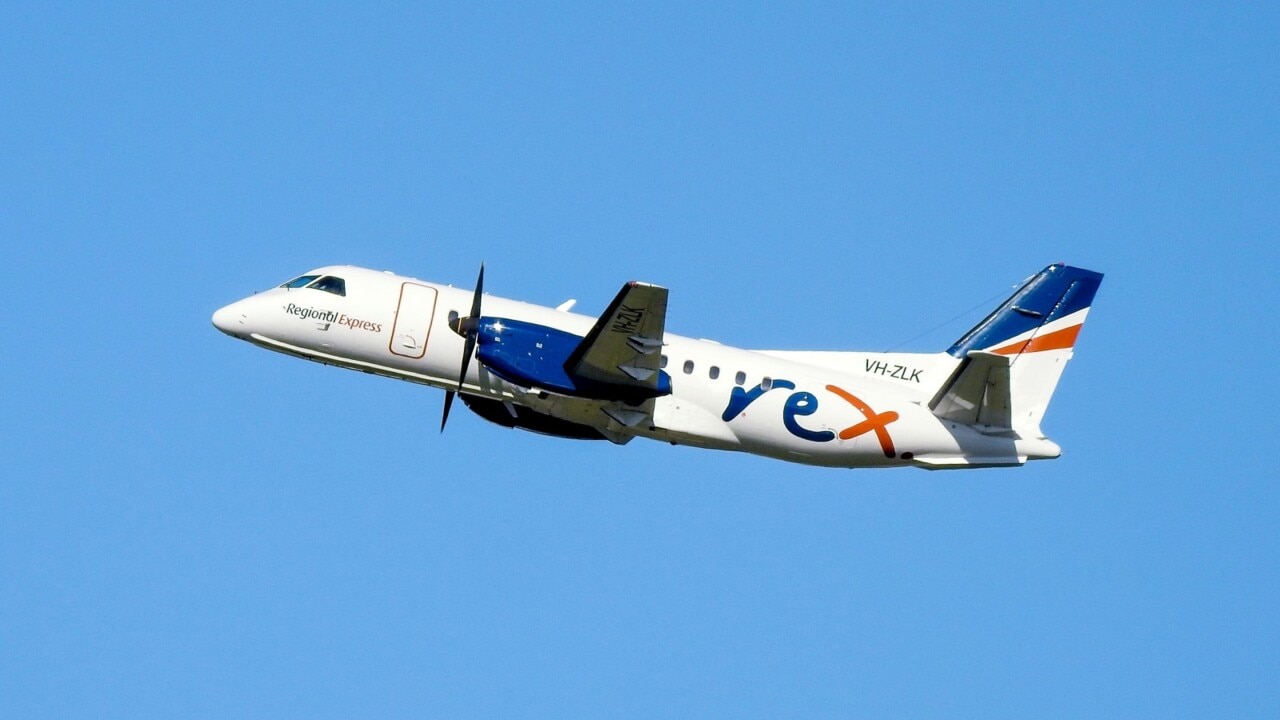Administrator targets new Rex owner within five weeks as pin pulled on 737 services
Rex administrators are preparing for a quick sale of the airline with Asian investor PAG considered the frontrunner.

Administrators tasked with the job of saving Rex from ruin expect to have a new owner in place in five weeks, with Asian investor PAG considered the frontrunner.
Ernst & Young announced late on Tuesday its appointment as voluntary administrator to Rex, after months of the airline’s heavy losses from jet operations and challenges with its regional fleet.
Its first move was to permanently ground the Boeing 737 fleet and cancel all major city flights, with Virgin Australia and Qantas agreeing to carry stranded Rex customers for free.
Second, a loan was secured by EY to ensure regional flights could continue for at least the duration of the administration.
EY partner Sam Freeman said several factors had contributed to Rex’s financial failure, including reduced flying by Saab 340 aircraft used for regional routes, and a lack of passengers on city routes.
He said it was important that travellers continued to book flights on regional services operated by Rex, and he confirmed that the jet operations were finished.
“The fleet has been grounded permanently and I don’t expect that to change,” Mr Freeman said.
Employees involved in the 737 routes are facing the axe, with unions claiming as many as 610 people were affected.
Mr Freeman acknowledged that it was a “difficult time” for employees and EY was trying to provide answers as quickly as possible.
“It’s very much our intention not to have a prolonged administration period,” he said, adding that it planned to present options to creditors on a sale within 25 working days, or five weeks.
Current investors including PAG were among those in discussions with EY about the sale of Rex, and external parties were also expected to show interest.
Mr Freeman said Rex was “not a Bonza operation”, which was unable to attract a buyer when the low-cost airline fell into administration three months ago.
“Bonza was not operating a regional network that Rex is around Australia, so I don’t think the two operations are comparable,” he said.
As news spread of the abrupt end to Rex’s three-year-old jet operations, customers and others in the aviation industry expressed their disappointment, and concern at the demise of another airline.

Megan Roughana, who was flying Rex from Melbourne to Mount Gambier on Wednesday, said she regularly used the airline to visit family in South Australia, and was sorry to hear of the administration.
“I have family in South Australia and so I travel quite a lot back and forth and they’re such a lovely airline to fly with,” Ms Roughana said.
“It’s just really sad. I really hope that the government will get behind them and support them to get them back up and running.”
Rees Campbell of Wynyard in Tasmania said Rex was “absolutely essential” for regional areas and should be propped up by government.
“We actually live within a couple of kilometres of the airport at Burnie, and we very much make an effort to fly Rex so that we are patronising it because I think it’s absolutely essential for regional areas,” she said.
“Other airlines have come and gone from Burnie, but Rex has remained.”
Unions and the opposition called for the federal government to ensure Rex’s regional flights continued, but Transport Minister Catherine King said it would not be providing a “blank cheque”.
“I think it’s fair to say just throwing money at the problem is not going to solve it,” Ms King told Bathurst radio 2BS.
“We want to see improved services, improved customer experiences. We want to have a say about the future of regional aviation as well in that process.”
Sydney Airport CEO Scott Charlton said it was good that regional operations were continuing, but it was clear that some things needed to change in the aviation market for competition to thrive.
“Recent history suggests the barriers are too high,” Mr Charlton said.
“We have a rare opportunity to get this right with the proposed slot reforms at Sydney Airport and through the imminent aviation white paper, and we remain ready to work with the government on implementing both.”
A Melbourne Airport spokesman said the suspension of Rex’s major city flights was deeply disappointing for consumers. The airport “extended significant support and flexibility to Rex for its jet operation, and we will now work with the administrators through their process,” he said.

The extent of Rex’s debts was not revealed by EY, but was thought to be in the vicinity of $350m.
Lessors, airports and investors were among those owed considerable sums as a result of the ill-conceived move into jet operations.
Swinburne law and corporate governance specialist Helen Bird said the events that had led to the administration did “not just suddenly happen”, and questions needed to be asked of Rex management.
She said what was on display at Rex was the “result of poor financial management and poor governance”. She added: “Why did Rex management let these losses continue to the point where they had a catastrophic effect on the company’s bottom line?
“Serious questions need to be asked by investors about what was going on at board level, the quality of its members and the reasons for its recent dramas.”
For travellers, the exit of Rex from major city routes was likely to mean less opportunity to land a cheap fare, with the airline bringing welcome competition to the industry.
Executive Traveller editor David Flynn said that, unfortunately, the end of Rex’s 737 ambitions would be widely seen as proof that Australia could not sustain more than three airlines.
“Rex expected Qantas to be its major competitor, but the flying kangaroo wisely kept its distance and handed the fight to Jetstar and Virgin Australia,” Mr Flynn said.
“Rex added a welcome dash of competition on the key intercity routes, but its mid-market position was undercut in price by Jetstar, while Virgin Australia tended to match Rex lead-in pricing but offered a superior proposition in frequency, lounges, frequent-flyer perks and overall value.”
Qantas and Virgin Australia described the administration as a “challenging day” and “difficult moment” for the aviation industry, while deflecting any suggestion that their behaviour had contributed to Rex’s demise.
Statistics on slot access at Sydney Airport showed that Rex had as many if not more slots per aircraft than Virgin Australia, and its share of peak versus off-peak slots was 60 per cent peak and 40 per cent off-peak.
Virgin’s was the same, and Qantas’s peak versus off-peak split was 57 per cent to 43 per cent, while Jetstar’s slots were split 50-50 between peak and off-peak.
Qantas pointed to the fact that the Australian Competition & Consumer Commission investigated complaints by Rex about the larger airline, and had found no evidence of anti-competitive behaviour.
“Qantas added 50 domestic and regional routes during the pandemic and only 10 routes were operated by Rex at the time,” a spokesman said. “Qantas and Jetstar haven’t entered a new route that was operated by Rex for more than two years.”






To join the conversation, please log in. Don't have an account? Register
Join the conversation, you are commenting as Logout